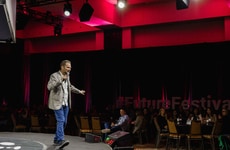Why the Most Connected Generation Doesn’t Overthink AI
Georgia Wray Norsten — March 27, 2025 — About
At Trend Hunter’s Future Festival, Chief Content Officer Armida Ascano broke down how Gen Z -- the largest and most digitally native generation -- is using AI in a way that’s fast, fearless, and intuitive. Born between the mid-1990s and early 2010s, Gen Z has never known a world without smartphones or social media. Unlike older generations, they don’t question whether to use AI-they already use it. The challenge isn’t adoption; it’s integration with purpose.
Ascano split Gen Z into three microgenerations: Z-Lennials (15–25) are entering the workforce and using tools like ChatGPT without hesitation -- sometimes without permission. While 75% of employers plan to ban AI use, Gen Z simply hides it. Ascano suggested companies adopt mutual mentorship models to bridge this gap -- letting young employees guide older ones in AI fluency. Z-Tribe (5–15) already uses AI in school, but their needs are about balance -- tools that promote focus and emotional intelligence, not just faster answers. And for Z-Alpha (0–5), the AI-native future is a mystery we’re just beginning to explore.
Gen Z treats AI as an invisible agent, quietly embedded in everything from education to entertainment. That insight, which was discussed deeply at this year’s AI-driven innovation summit, points to a significant shift: AI doesn’t need to announce itself to Gen Z- it just needs to work. The biggest opportunity? Creating seamless, emotionally intelligent tools that grow with them.
At Future Festival 2025, Ascano emphasized that understanding Gen Z’s comfort with AI will be key to designing future-forward workplaces, products, and learning environments. If you're looking to future-proof your strategy, Future Festival 2025 in New York City is one of the top trend forecasting conferences for unlocking AI’s next chapter.
Image Credit: Yoav Aziz on Unsplash
Ascano split Gen Z into three microgenerations: Z-Lennials (15–25) are entering the workforce and using tools like ChatGPT without hesitation -- sometimes without permission. While 75% of employers plan to ban AI use, Gen Z simply hides it. Ascano suggested companies adopt mutual mentorship models to bridge this gap -- letting young employees guide older ones in AI fluency. Z-Tribe (5–15) already uses AI in school, but their needs are about balance -- tools that promote focus and emotional intelligence, not just faster answers. And for Z-Alpha (0–5), the AI-native future is a mystery we’re just beginning to explore.
Gen Z treats AI as an invisible agent, quietly embedded in everything from education to entertainment. That insight, which was discussed deeply at this year’s AI-driven innovation summit, points to a significant shift: AI doesn’t need to announce itself to Gen Z- it just needs to work. The biggest opportunity? Creating seamless, emotionally intelligent tools that grow with them.
At Future Festival 2025, Ascano emphasized that understanding Gen Z’s comfort with AI will be key to designing future-forward workplaces, products, and learning environments. If you're looking to future-proof your strategy, Future Festival 2025 in New York City is one of the top trend forecasting conferences for unlocking AI’s next chapter.
Image Credit: Yoav Aziz on Unsplash
5.5
Score
Popularity
Activity
Freshness






















